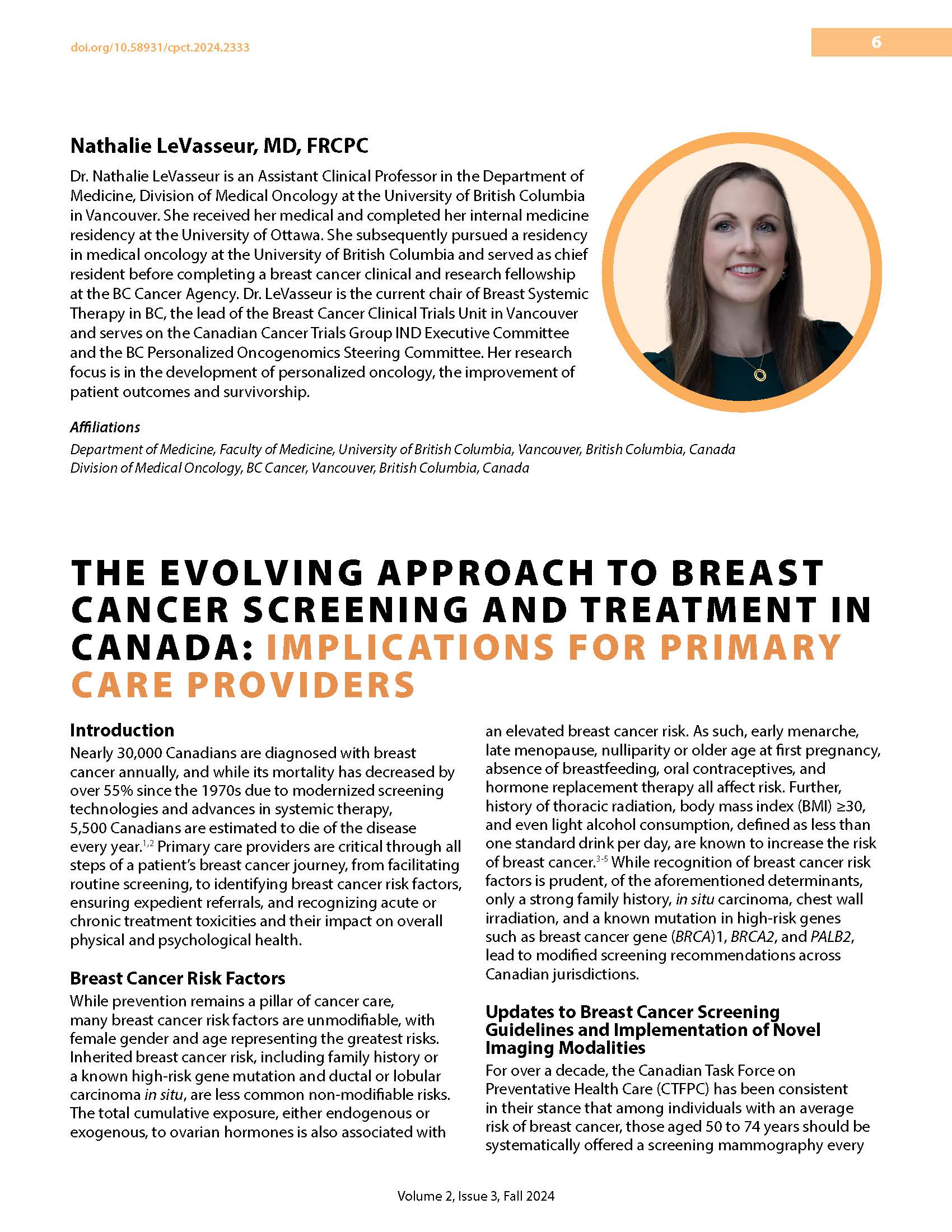The Evolving Approach to Breast Cancer Screening and Treatment in Canada: Implications for Primary Care Providers
DOI:
https://doi.org/10.58931/cpct.2024.2333Abstract
Nearly 30,000 Canadians are diagnosed with breast cancer annually, and while its mortality has decreased by over 55% since the 1970s due to modernized screening technologies and advances in systemic therapy, 5,500 Canadians are estimated to die of the disease every year. Primary care providers are critical through all steps of a patient’s breast cancer journey, from facilitating routine screening, to identifying breast cancer risk factors, ensuring expedient referrals, and recognizing acute or chronic treatment toxicities and their impact on overall physical and psychological health.
References
Brenner DR, Poirier A, Woods RR, et al. Projected estimates of cancer in Canada in 2022. CMAJ 2022;194:601-7. DOI: https://doi.org/10.1503/cmaj.212097
Caswell-Jin JL, Sun LP, Munoz D, et al. Analysis of Breast Cancer Mortality in the US – 1975 to 2019. JAMA 2024;331:233-41. DOI: https://doi.org/10.1001/jama.2023.25881
Kantarjian HM, Wolff RA, Rieber AG. The MD Anderson Manual of Medical Oncology. Fourth Edition. New York City: McGraw Hill; 2022.
Thériault G, Slavtcheva N, Flemming J, et al. Breast Cancer (2024 Update) – Draft Recommendations. Canadian Task Force on Preventative Health Care; May 30, 2024 [September 22, 2024]. Available from: https://canadiantaskforce.ca/breast-cancer-update-draft-recommendations
Hellquist BN, Duffy SW, Abdsaleh S, et al. Effectiveness of population-based service screening with mammography for women ages 40 to 49 years: evaluation of the Swedish Mammography Screening in Young Women (SCRY) cohort. Cancer 2011;117:714-22. DOI: https://doi.org/10.1002/cncr.25650
Coldman A, Phillips N, Wilson C, et al. Pan-Canadian study of mammography screening and mortality from breast cancer. J Natl Cancer Inst 2014;106:dju261. DOI: https://doi.org/10.1093/jnci/dju261
Wilkinson AN, Ellison LF, Billette JM, et al. Impact of Breast Cancer Screening on 10-Year Net Survival in Canadian Women Age 40-49 Years. J Clin Oncol 2023;41:4669-77. DOI: https://doi.org/10.1200/JCO.23.00348
Nicholson WK, Silverstein M, Wong JB, et al. Breast Cancer: Screening – Final Recommendation Statement. U.S. Preventative Services Task Force; April 30, 2024 [September 22, 2024]. Available from: https://www.uspreventiveservicestaskforce.org/uspstf/recommendation/breast-cancer-screening#bootstrap-panel--12
D’Orsi C, Sickles E, Mendelson E, et al. Breast Imaging Reporting and Data System. ACR BI-RADS® Atlas, American College of Radiology; 2013 [September 22, 2024]. Available from: https://www.acr.org/Clinical-Resources/Reporting-and-Data-Systems/Bi-Rads
Kolb TM, Lichy J, Newhouse JH. Comparison of the performance of screening mammography, physical examination, and breast US and evaluation of factors that influence them: an analysis of 27,825 patient evaluations. Radiology 2002;225:165-75. DOI: https://doi.org/10.1148/radiol.2251011667
Butler RS, Hooley RJ. Screening breast ultrasound: update after 10 years of breast density notification laws. AJR AM J of Roentgenol. 2020;214(6):1424-35. DOI: https://doi.org/10.2214/AJR.19.22275
Ohuchi N, Suzuki A, Sobue T, et al. Sensitivity and specificity of mammography and adjunctive ultrasonography to screen for breast cancer in the Japan strategic anti-cancer randomized trial (J-START): A randomised controlled trial. Lancet 2016; 387:341-8. DOI: https://doi.org/10.1016/S0140-6736(15)00774-6
Cheung Y, Lin Y, Wan Y, et al. Diagnostic performance of dual-energy contrast-enhanced subtracted mammography in dense breasts compared to mammography alone: Interobserver blind-reading analysis. Eur Radiol 2014;24:2394-403. DOI: https://doi.org/10.1007/s00330-014-3271-1
Lee C, Monticciolo D, Moy L. Screening Guidelines Update for Average-Risk and High-Risk Women. AJR AM J of Roentgenol. 2020;214(2):316-323. DOI: https://doi.org/10.2214/AJR.19.22205
Cortazar P, Zhang L, Untch M, et al. Pathological complete response and long-term clinical benefit in breast cancer: the CTNeoBC pooled analysis. Lancet 2014;384:164-72. DOI: https://doi.org/10.1016/S0140-6736(13)62422-8
Schmid P, Cortes J, Pusztai L, et al. Pembrolizumab for Early Triple-Negative Breast Cancer. N Engl J Med 2020;382:810-21. DOI: https://doi.org/10.1056/NEJMoa1910549
Gianni L, Pienkowski T, Im YH, et al. Efficacy and safety of neoadjuvant pertuzumab and trastuzumab in women with locally advanced, inflammatory, or early HER2-positive breast cancer (NeoSphere): a randomised multicentre, open-label, phase 2 trial. Lancet Oncol 2012;13:25-32. DOI: https://doi.org/10.1016/S1470-2045(11)70336-9
Cortes J, Rugo HS, Cescon DW, et al. Pembrolizumab plus Chemotherapy in Advanced Triple-Negative Breast Cancer. N Engl J Med 2022;387:317-26. DOI: https://doi.org/10.1056/NEJMoa2202809
Nakai Y, Otsuka T, Inoue T, et al. Two cases of delayed onset of immune-related adverse events after discontinuation of nivolumab in patients with metastatic renal cell cancer. IJU Cas Rep 2021;4:326-9. DOI: https://doi.org/10.1002/iju5.12338
Schneider BJ, Naidoo J, Santomasso BD, et al. Management of Immune-Related Adverse Events in Patients Treated With Immune Checkpoint Inhibitor Therapy: ASCO Guideline Update. J Clin Oncol 2021;39:4073-126. DOI: https://doi.org/10.1200/JCO.21.01440

Published
How to Cite
Issue
Section
License
Copyright (c) 2024 Canadian Primary Care Today

This work is licensed under a Creative Commons Attribution-NonCommercial-NoDerivatives 4.0 International License.
